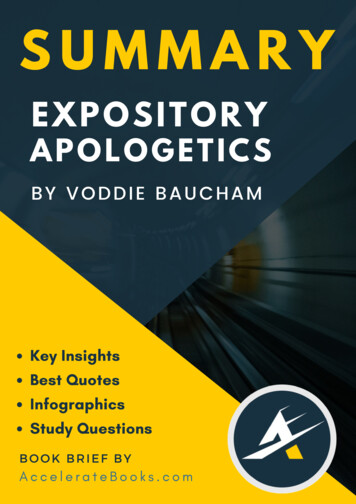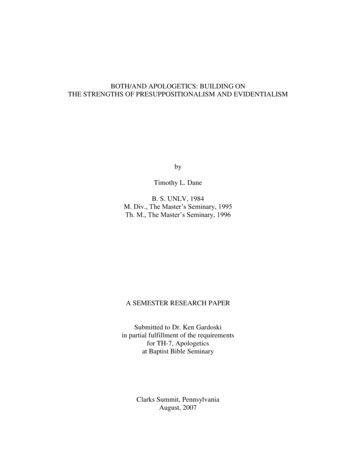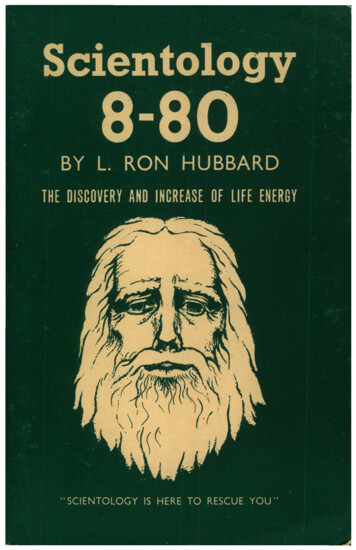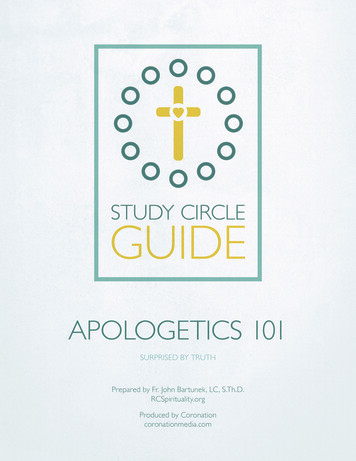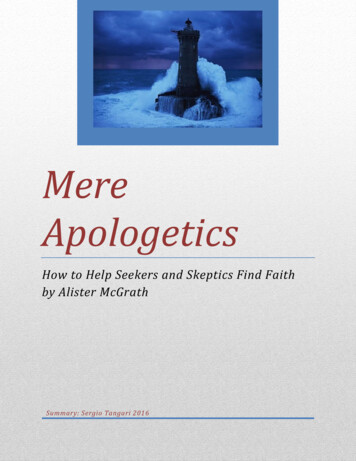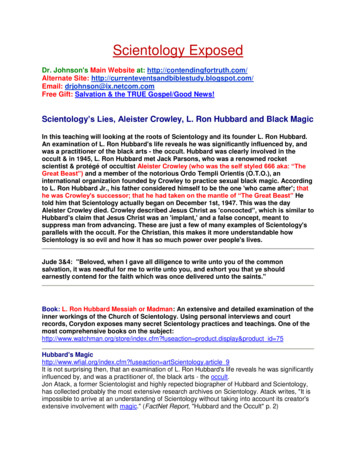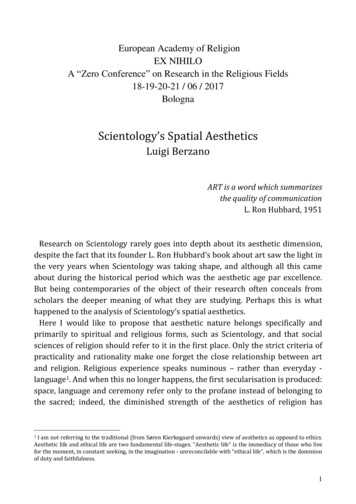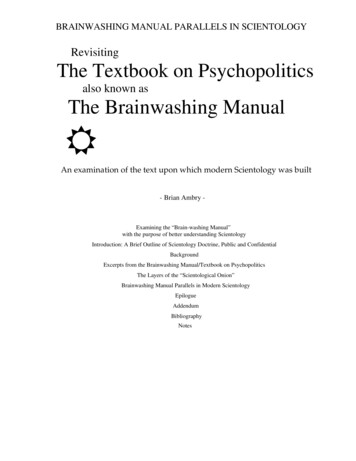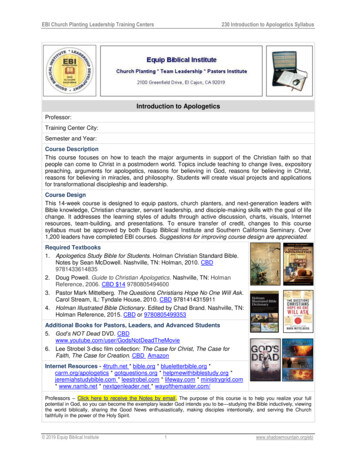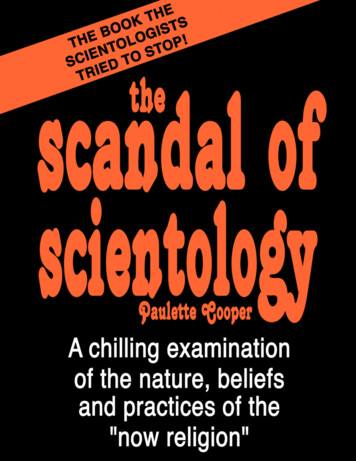
Transcription
CONTENTSThe Tragi-Farce of ScientologyPaperback Cover NotesPrefaceEpigraph 1IntroductionFrom Dianetics to ScientologyThe ConfessionalsLife and Sex in the WombHave You Lived Before This Life?Spreading the WordThe OrgThe Sea OrgThe British and Australian OrgsAttacking the AttackersThe SuppressivesThe Sexual and Criminal Security CheckThe World of ScientologyChildren and CelebritiesScientology -- Business or Religion?Is Scientology Political?Scientology Versus MedicineThe Secret Scientology SessionsThe E-MeterThe High Cost of ScientologyThe Truth About L. Ron HubbardDoes Scientology Work?ConclusionEpigraph 2Appendix: The Scientologist's StoryBibliography of Sources ConsultedAbout the AuthorChanges from the Paperback EditionIndex / Paperback Page IndexThe Story of Paulette Cooper
PrologueThe Tragi-Farce of ScientologyThis article, captioned "Paulette Cooper reports from America," was published in the December1969 issue of the British magazine Queen (page 109).If you think you have problems with Scientology in England, you should see what's happening in theStates. Here, they pass out their leaflets on the street corners of some of the most pukkaneighbourhoods, urging innocent bystanders to try out Scientology. Those who have accepted theinvitation have found themselves in one of their many dingy headquarters, listening to a dull lectureon Scientology, followed by a film of equal merit on its leader, L. Ron Hubbard. Those who didn'twalk out then may have submitted to the American Personality Test (in England, it's the OxfordCapacity Analysis), probably not realising that the B.Scn, D.Scn, DD, and BA degrees of the girl whowrote the test stood for Bachelor of Scientology, Doctor of Scientology, and Doctor of Divinity in the"Church" of Scientology only. And who knows what that BA stood for? Maybe in her case it waslegitimate, although one Scientologist in Australia admitted that her "BA" stood for "BasicAdministrator" and "Book Auditor" -- the latter meaning she had bought a book on how to applyScientology to others.But people come to the headquarters anyway, take the test, accept the results, and sign up forScientology. At least 150,000 people in the United States have taken that final irrevocable step, andthe Scientologists claim that at least 100,000 British people are also members of the cult inEngland.But it's true that we in America are to blame for starting it all. Scientology sprang like a phoenix fromthe dirt of "Dianetics", one of the typical crazy fads that sweeps our country periodically. Dianetics hitlike a hurricane in 1950, attracting thousands of people, mostly on the West Coast, by promising tocure them of their mental and physical problems without all those tedious hours required bypsycho-analysis. Dianetics even had some attraction for those people who had always secretlywanted to play doctor, because it allowed them to analyse others without all those tedious yearsrequired to train for it. But a few critics had to come along and spoil the fun. Dianetics, and itsfounder, L. Ron Hubbard, were discredited by the real doctors, and the country deserted Dianeticsto search for Bridey Murphy (an Irish woman who believed she had been reincarnated).But Dianetics was also quietly undergoing a rebirth, changing its name -- to Scientology -- andadding a new element -- "religion" -- which enabled it to avoid paying American income taxes.Today, this "Church of Scientology", as it is called, says it is people's "spiritual" problems that it isconcerned with now.The method, which resembles a combination of psychotherapy and the Catholic confession, is stillbasically the same: the Scientology "patient", or "preclear", as a newcomer is called, revealsintimate details of his past to a "reverend" in the Church of Scientology. Unfortunately, thesimilarities seem to end there. First, the confessional material is not kept completely confidential,since a preclear's records are available to all of his reverends, or "auditors" as they are called -who may eventually number as many as five or six -- and unbeknown to the preclear, intimateportions of his records have sometimes been sent to the main Scientology headquarters, whichare now in Saint Hill, East Grinstead, Sussex. (This can be compared to a priest's sending copiesof the confession -- with names -- to the Vatican.)Second, these auditors, some only in their teens or early twenties, who listen to problems that are
often sexual, do not always maintain a proper relationship with their preclears. One male auditorwrote on a preclear's file that she was "sexy as hell", and another auditor, called Reverend Fisk,was not only sleeping with his preclear, but revealed the fact to her husband. The case wouldprobably never have come to light except that the husband killed the Scientology reverend.And finally, other ethical difficulties may arise because the auditors, whose medical andpsychological qualifications are certainly questionable, are not always examined too carefully fortheir background either. One auditor here agreed to practise Scientology on a couple with threeyoung daughters if he could move into their house with them. Later, after he disappeared, theparents learned that this Scientology auditor had tried to track down their daughters in Girl Scoutcamp and grammar-school, and was in trouble in another state for showing sexual interesttowards very young girls.This "confession", "therapy", or to use their word, "auditing", that Scientologists perform, is done byhaving the preclear hold two tin cans, which are connected to a crude galvanometer they call an "Emeter". Although a US spokesman stated that the E-meter is subject to "uncontrollable variations inskin contact and current", the preclear believes the E-meter works like a lie-detector, or a "truthdetector" as he prefers to call it, and he tells his auditor intimate details of his life -- while hisauditor takes notes.Not all of the personal information Scientologists reveal has been voluntary either, since somepreclears have been made to take what Scientologists call a "security check", at which time, thepreclear, while holding on to the E-meter (which, remember, he thinks works like a lie-detector),was asked by his interrogator or auditor whether he had ever been insane, a communist, a spy, orhad a police record, raped anyone or been raped, had an abortion or performed one, practisedcannibalism, adultery, sex with animals, exhibitionism, incest, miscegenation, pederasty,prostitution, voyeurism, masturbation etc.The purpose of this auditing is to help a preclear get rid of his "engrams", which Scientologistsbelieve are a type of impression imprinted on the protoplasm itself and are the root of all mentalaberrations. L. Ron Hubbard, who devised these theories, believes that these "engrams" can beincurred when the person is still in the womb, and even at conception -- although he has nevermade it clear exactly how an engram could have been implanted before a foetus had developed anervous system or the sense organs with which to register an impression. Scientologists simplyaccept his theory that if a husband beats his pregnant wife and shouts "take that" as he hits her, anengram is planted, and when Junior is born he might grow up to take this literally, and become athief whose goal is to "take that".But the fathers aren't the only villains. Most of the mothers Hubbard depicted make Medea look likethe Madonna. They were giving their unborn children engrams with AA -- attempted abortion (andthere are so many abortions in Hubbard's case histories that it's a miracle that any of us got here atall), and when they weren't being knocked down or knocked up by their husbands, they wereusually having affairs. This situation could also lead to engrams, especially if the child in the wombwas ultimately to be named after the father. Hubbard believed that many of these unfaithful wivesmade unpleasant remarks about their husbands to their lovers during coitus, and that Junior, whowas being knocked unconscious in the womb by the sex act, would hear these remarks aimed athis father and think that they applied to him, because he had been given the same name (don't askhow the child knew what his name was going to be). If it seems amazing that these engrams couldhear and pun, there are even stranger cases, where they were said to misrecord as well. Oneauditor reported that a rash on the backside of his preclear started when the preclearwas in thewomb and his mother frequently asked for an "aspirin". The engram was said to have mistakenly
registered this as "ass burn".While undergoing this auditing, or erasing of engrams, the preclear begins to hallucinate not onlyabout life in the womb, but also about his many past lives, since Scientologists believe that we, orour "thetans" (ie "spirits") have been around in some form or another for seventy-four trillion years.One Scientologist is said to have gone into a state of grief when she realised she had been herfather's lover -- before she was born. Another Scientologist "discovered" during his auditingsessions that his current headaches started when he was a Roman centurion during the Battle ofCannae in 216 BC. He believes that someone from the Roman Burial party, mistakenly believinghim dead, tried to kick his helmet back on to his head.Scientologists are relentless in their attempts to get others to share their "religious" beliefs, andwhile some of their proselytising is probably based on their sincere desire to spread the joy ofScientology, there's another motive they never admit to: Scientologists in America receive a ten percent cash rebate on any money spent by a convert they've brought in. Once a potential convert doesshow up, he may find it very hard to escape, since Scientologists immediately register every personwho comes into their headquarters, or "org" as they call it (short for organisation), and from thatmoment on, the potential convert will receive a relentless mountain of mail urging him to joinScientology. One actor from Greenwich Village, who went to the "org" out of curiosity, tried to make itimmediately clear to the Scientologists that he did not want to receive the incessant phone callsand letters to which a Scientology friend of his had been subjected. They agreed to take this actor'sname off their mailing list, but they then hounded him to reveal the name of his friend who hadcomplained about the phone calls, so that they could "call him and talk with him about it". And ohyes, today, one year later, the actor still receives mail from Scientology.Those who do join Scientology must take one of two series of prescribed courses. The first group,auditing, consists of several levels which enable a Scientology "preclear" to become a "clear", ie, aperson who is supposedly free from ailments that range from colds to cancer, and who has an IQof over 135, etc. While everything is expensive in America, the price of these courses is ridiculous.In order to "go clear", a preclear must take courses that begin at 311, then 208, 499, 322, 250, and finally 333! Those who wish to rise above "clear" to reach the highest Scientology levelof "Operating Thetan VIII" (defined as someone who can function without the aid of their body) mustpay a whopping 1,185 more.But that's just half the story, since Scientology also trains people to become auditors. Auditors don'teven need a high-school education -- just more Scientology courses. These courses generally takea couple of months, although Scientologists sometimes boast that they can train some people totreat others in "less than twenty minutes". Training, which is much cheaper than auditing, is used tointroduce people to Scientology here, perhaps because it starts at a modest 6, 13, and 19before suddenly leaping to their more typical rate of 541.Scientologists get people to pay these incredible fees by promising to return money to anyone whois dissatisfied. Unfortunately, however, they have occasionally set up certain conditions that havemade this difficult. One Australian woman signed up for 300 hours of Scientology but decided soonafterwards that it was aggravating rather than alleviating her problems. When she tried to get hermoney back, however, she claims they wrote her that she would have to take and pay for all 300hours before she could ask for a refund.Scientology is so expensive that most Scientologists leave their jobs and go to work for the org,sometimes for no pay but just training units, sometimes at a salary that is less than a quarter ofwhat they would receive on a regular job in the States. Some Scientologists choose credit instead,
and unpaid notes have been turned over to collection agencies, legal action has been threatened,and people have been harassed and intimidated, like the American father who received thefollowing letter when he protested a 145 bill for fifteen hours of audition for his son.". I am expert at harassment, try me and find out . one more word out of you and I'll have youinvestigated . I'll just start my people to work on you and before long, you will be broke, and out ofa job, and broken in health . you won't take long to finish off. I would estimate 3 weeks.Remember: I am not a mealy mouthed psalm canting preacher. I am a minister of the Church ofScientology! I am able to heal the sick and I do. But I have other abilities which include aknowledge of men's minds that I will use to crush you to your knees. You or any."The letter, signed by a Reverend Andrew Bagley, Organisation Secretary, had a short PS appended:"Don't reply to this letter. If I want to get in touch with you, I'll be able to find you. Anywhere." PS. Thefather paid the bill.Scientologists repeatedly emphasise that the leader, L. Ron Hubbard, or "Ron" as the believerscall him, makes no money from all this, although he receives a standard ten per cent tithe andsometimes more from the gross income of the twenty-one Scientology orgs (throughout the world)and their hundreds of franchises (a strange structure for a supposed Church!). He also makesmoney from books he's written on Scientology, and in America, he requires that all orgs buy morethan 4,160 worth of them -- fifty per cent off for cash -- or he declares the Executive Secretary,whose job it is to purchase these books, "non-existent".Another source of his income is a booklet called Expand, whose title unfortunately doesn't refer toany potential of the mind. Expand pushes almost 2,080 worth of films and tapes of Hubbard,certificates for marriages, funerals and christenings in the Scientology Church (which is legal inmany US states), Old Father Hubbard's cupboard of E-meters (which auditors must purchase for 351 each, although they cost only 5 to build), and pictures of Hubbard himself for only 2 10sapiece.Perhaps Hubbard's imagination as a businessman stems from his earlier days as a sciencefiction writer, who apparently took his work rather seriously, since he claimed to have visitedHeaven twice, the planet Venus, and the Van Allen radiation belt. In fact, Scientology was firstpresented (as Dianetics) in the American Astounding Science Fiction magazines, and laterexpanded into a best-seller called Dianetics: The Modern Science of Mental Health.Although many of his statements do sound as if he's from out of this world, Hubbard has statedthat he does not wish to be deified by his followers. Nonetheless, he has revised the calendar toread "AD 1, AD 10" etc. ("After Dianetics, 1951," etc) and claimed that his discovery of Dianetics (ie,Scientology without the religion) was a "milestone for Man comparable to his discovery of fire andsuperior to his invention of the wheel and arch".Not everyone agreed that he has made such great contributions. The New York Times, whichcurrently accepts Scientology ads in, of all places, their Church column, reported on 24th April,1951 that one of Hubbard's earlier wives was suing him for divorce, claiming that doctors had saidhe was a "paranoid schizophrenic" and that he had tortured her by "beating her, strangling her anddenying her sleep".It should also be noted that Hubbard, who often calls himself a nuclear physicist, and claims a BSfrom George Washington University and a PhD from Sequoia University, actually flunked physics,was placed on probation his first year at George Washington and didn't return afterwards; and
Sequoia University in California, which was originally called the College of Drugless Healing,delivered mail-order doctorates. Nonetheless, Hubbard calls himself "Doctor" and he does indeedhave a D.Scn -- or Doctor of Scientology.While the Church of Scientology creed states that all men have the right "to think freely, to talk freely,to write freely their own opinions and to counter or utter or write about the opinions of others", thisdoesn't seem to apply to anyone who wishes to think, talk, or write against Scientology. A few of thearticles and books on Scientology and Dianetics have strangely "disappeared" from the New YorkPublic Library. Scientology offers a 4,180 reward to anyone who can give information "leading tothe prosecution of those responsible for the attacks on Scientology". One writer in America tried tospeak out against them on the telly. Before he went on the air, he learned that the Scientologistshad found out about his plan and had called friends of his for personal information on him,"because we're going to get him".A Scientologist is the last person in the world permitted to speak against Scientology, and if hetries, he becomes a "suppressive person" and "enemy of Scientology" and no other Scientologist ispermitted to associate with him. Anyone who knows a suppressive is "reviewed" (and charged forit!) and declared a "Potential Trouble Source" or "PTS" until he "handles or disconnects" from thesuppressive. If a Potential Trouble Source refuses to disconnect from someone on thesuppressive list, he becomes suppressive, and one American boy was declared suppressive forfailing to disconnect from his father -- although the child was only ten years old!Another "suppressive", Raymond J. D. Buckingham, an English basso who administers a voiceschool in Manhattan, was initially so impressed with Scientology that he convinced several of hisstudents and his fiancée to join. But when he discovered that his auditor was revealing personalinformation about him, and that the reverend who was his fiancée's auditor was trying to seduceher, he'd had it. When he went to the Scientologists to complain, however, he was told he wouldhave to pay them 10 to discuss it and "get their advice". Totally disgusted, he had the courage tospeak against Scientology on a radio programme. The Scientologists countered by declaring him a"suppressive person", "outside their protection" and "fair game". They ordered his students whohad become Scientologists (at his recommendation) to disconnect from him and the money theylegally owed him. He received phone calls threatening his life, and his fiancée, who was toofrightened to leave Scientology, was held in a room at the org in Manhattan for four hours until sheagreed to sign a statement saying that Buckingham had threatened to kill her.The story does have a happy ending. Two, in fact. They eventually did get married and both have leftScientology.But most stories don't have such happy endings there, because most people who join Scientologystay there. It would be foolish for them not to, because they have revealed much intimateinformation about themselves during their auditing and security test, and this information is kept infiles which are hardly dead, since they are sometimes brought out and discussed withScientologists if they're having some difficulties -- like perhaps they want to leave the group. In aPolicy Letter of l9th April, 1965, Hubbard stated that a Scientologist who left without reporting to theleaders or letting his auditor handle the matter "must be fully investigated at any cost". In fact,Hubbard wrote the following to the secretary of the Melbourne headquarters about a boy who wasgiving them trouble: "H (a well-known Scientologist) blew up in our faces . we have criminalbackground on him. Rape of a girl pc (preclear) in Dallas and countless others. This will dosomething to (another Scientologist). Now I firmly believe you will be able to find a criminalbackground this life on and (two more Scientologists)."
But most Scientologists stay there not because they fear investigations or blackmail but becausethey genuinely believe in their Church and its principles. Scientologists are perfectly contented to"disconnect" or divorce themselves from their "suppressive" spouses or parents, if necessary,remarry other Scientologists, have their own children audited, leave their jobs, and become part ofthe world of Scientology -- a world so different from the real one that it hits you like the heat on a hotsummer day from the moment that you walk into an org. It's a world with its own morality, accordingto the Australian inquiry into Scientology which found that a Scientologist can seduce a fifteen-yearold girl because she's really over seventy trillion plus fifteen-years-old -- obviously past the age ofconsent. The Scientology world has its own language, which often makes them sound as if they'reeating a metaphysical alphabet soup (PTS, Org, SP, LRH, MEST, etc).People who become part of the Scientology world even look different, because Scientologists aretrained to stare in the eyes of others in an "eye-lock", while acknowledging everything said to themverbally ("Beautiful", "Groovy") in a way that can sometimes be unnerving. Scientologists have theirown system of justice, with misdemeanours, crimes, high crimes and punishments, eg beingmade to wear a dirty rag or a handcuff on their arm if they break the Scientology rules.And finally, yes -- they do have church services -- if one could call them that. During one outdoorservice in Manhattan's Central Park, the first speaker told how wonderful Scientology was and thesecond sang probably the dirtiest lyrics ever heard within a supposedly clerical setting.Although in England Scientology is not a religion -- the Registrar General refused to register SaintHill under the Place of Worship Registration act of 1855 -- by calling itself a Church in America,Scientology has so far been able to avoid not only taxes, but difficulties, since American laws allowa great deal of latitude toward anything that calls itself a religion. And the religion adds an air ofrespectability which is reinforced by the full clerical garb worn by some Scientologists (whichincludes a cross "bigger than the Archbishop of Canterbury", as one Londoner describes it).But outside America, things have not been so easy for the Scientologists. In Victoria, theLieutenant-Governor appointed a special board of inquiry to look into Scientology because ofnumerous complaints as to their activities. Although this inquiry had the limitations of being a oneman commission, this man was thorough enough to spend 160 days listening to four millionwords of 151 witnesses, and on the basis of this testimony, he concluded that Scientology was"evil", that it had "no worthwhile redeeming features" and that it was "the world's largestorganization of unqualified persons engaged in the practice of dangerous techniques whichmasquerade as mental therapy". The Government accepted his conclusions, and a law waspassed in 1965 making teaching Scientology, applying it, or even advertising it, punishable in theState of Victoria in Australia by up to 500 and two years in jail. And Scientology has also now beenbanned in the State of South Australia.In England, Scientology has been making news -- and trouble -- since 1959, when Hubbard leftAmerica (because "the atmosphere was being poisoned by nuclear experiments") and bought thepalatial Saint Hill Manor in East Grinstead, formerly the home of the Maharaja of Jaipur. Hubbardswitched the headquarters of Scientology to England and sent his decrees by Telex from thismansion to his "orgs" in five continents.An inquiry is currently under way to investigate Scientology in England, but in America, unlikeEngland and Australia few people are brave enough to try to stop it. Scientology is growing rapidlythroughout many major American cities and they have tripled or quadrupled their numbers in thepast three years alone.
There is no doubt that Scientology has helped some of its converts, although it is certainlydebatable whether it is a form of faith-healing effective on people so suggestible that they wouldhave been helped by anything. But there is also no doubt that there are others that it has nothelped. Preclears have had psychiatric treatment and/or hospitalisation after they left Scientology.Letting anauditor, without proper medical or psychological training treat the "spirit" would seem tobe a dangerous practice. And letting an auditor solve problems by taking people back to formerlives may lead them to believe they're doing something about their problems when in reality theycould be getting worse.There are fourteen stages of crawling before a child can actually walk; the mind too, develops incertain hierarchical steps, each of which must be stabilised somewhat before the person cansafely move on. Scientologists, encouraged by auditors whose qualifications are questionable,may move on to the next step before they are ready to handle it. And like walking before they cancrawl -- they may fall flat on their psychical faces.
Paperback Cover NotesBack Cover of the Paperback EditionScientology -- The World of the Totally Free?Scientology has been called the "now religion" and claims to be one of the world's fastest growingreligious sects. Just what is Scientology? What kind of people does it attract, what does it do forthem, and how does it hold them? This fascinating study of a group that already exercisesinfluence over many Americans and is growing rapidly reveals the truth about: L. Ron Hubbard, Scientology's patron saint; the Sea Org, Scientology's lavish yacht on the Mediterranean; the E-meter, Scientology's lie detector; auditing sessions where people reveal their most intimate sexual experiences; the criminal security test; Scientology's political ambitions and how Scientology relates to celebrities.Is Scientology therapeutic and helpful, or does it toy dangerously with blackmail, tyranny, andhypnotism?You must read this book before you are charmed into "the world of the totally free."
Inside the Front CoverScientology Is it really a religion? Why does it cost so much? Why do so many attractive young men and women join? Do Scientology reverends become sexually involved with their clients? Was Charles Manson a Scientologist? Why was Scientology banned in Australia? What qualifications do Scientology "auditors" have? What happens to people who leave Scientology? What do doctors say about Scientology's therapeutic claims?An alarming exposé that will tell you the truth about Scientology.
THE SCANDALOF SCIENTOLOGYPaulette CooperA TOWER BOOK
Tower Publications, Inc.185 Madison AvenueNew York, New York 10016Copyright MCMLXXI by Paulette CooperPrinted in U.S.A.All Rights Reserved
Dedicationto my parents TED & STELLAwith all my love, and thanks
PrefaceThe Scandal of Scientology is not the story of one isolated group. It tells of a loosely organizednetwork of hundreds, perhaps thousands, of franchises, "Orgs," "Churches," etc., that have beenestablished in various parts of the world.Each group has its own personality. Because one incident may have occurred in Australia orEngland, it does not necessarily mean that it has happened, or even could happen, in America, orvice versa. The only thing the Scientology groups or "Orgs" have in common is their acceptance ofL. Ron Hubbard's theories and policies.This book contains more historical than contemporary material. Some of the information comesfrom an American tax case that ran from 1956 to 1959; some of it comes from a 1963-1965 Inquiryin Victoria, Australia; and some comes from statements Hubbard made in the 1950's.Every day there are new directives, cancelling old policies and creating new ones so that thenature, beliefs and practices of Scientology are constantly changing. It is to Hubbard and theScientologists' credit that the direction is generally a positive one, and that some of the lesslaudable practices outlined in this book appear on the wane.I have tried to present the Scientologists' statements (quoting them directly whenever possible) andactions, along with the statements and actions of those who are against them or who have haddifficulties with them.Until now, Scientologists have been able to keep the stories a secret, generally by suing. However,as more inquiries into Scientology are made, as more news stories about the organization areprinted, and as more criticism against Scientology is levied, Scientologists may discover that lawsuits are ineffectual. Instead of trying to hide what is going on in their house, they may have to cleanit up.If they don't, various national governments may not permit them to survive. The Scientologists arealready recognizing this. Like many groups that were formerly enfantes terribles, Scientology, if itcontinues in its current clean-up campaign, may one day become one of the world's mostrespected groups or Churches.It has taken more than two years to gather all the material in this book. I would like to thank a few ofthe people who unselfishly gave of their time and energy to aid the project.First, I'd like to thank those who helped in the early phases of the manuscript: Hayes B. Jacobs, C.Michael Curtis, and especially, Ann Barr, and Queen Magazine which published a small portion ofthis book.I am also especially grateful for the help later on of Michael I. Sanders, Ray Buckingham, Ralph LeeSmith, Susan Kideck
Administrator" and "Book Auditor" -- the latter meaning she had bought a book on how to apply Scientology to others. But people come to the headquarters anyway, take the test, accept the results, and sign up for Scientology. At least 150,000 people in the

